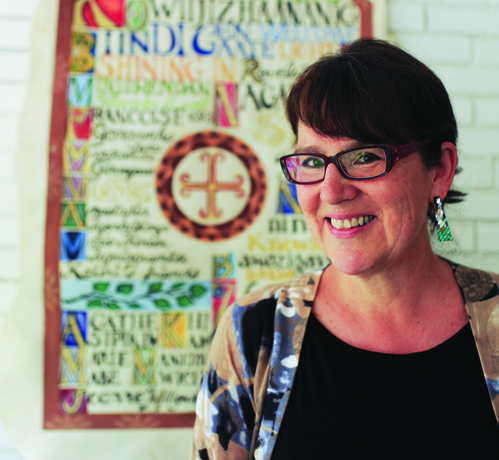
Sherry Farrell Racette, associate professor, Native studies and women & gender studies.
Coffee With a Co-worker: Sherry Farrell Racette
Research endeavours are tightly interwoven with personal interests for U of M associate professor Sherry Farrell Racette — and that ’s the way she likes it.
Farrell Racette research interests lie in Metis and First Nations women’s histories and indigenous art histories that reclaim women’s voices through re-contextualized museum collections; she teaches in the Native studies and women’s and gender studies departments. As a young person of mixed ancestry, including Algonquin, Cree, Mohawk and Irish heritage, Farrell Racette says she formed a strong identity with the Metis community, something that has shaped her career.
She holds an undergraduate degree in fine arts from the U of M, as well as a teaching certificate, a master’s of education from the University of Regina, and a PhD from the U of M. She has several publications to her name.
According to Farrell Racette, the interdisciplinary nature of the work is essential because her research interests surrender scant historical records.
“Most of what I do is related to women’s history or other areas — mostly of history — that are absent or marginalized, and I really have to turn every stone. If you stick exclusively in one discipline, then you’re limited to the resources of that discipline. I find that I just look everywhere.”
Also a visual artist, Farrell Racette works in a variety of mediums, including painting, multi-media work and illustrating children’s books. Her current project is an historical analysis of Metis clothing and beadwork, a craft that is a big part of her own life. She learned to bead as a teen and she now teaches beading to her students in preparation for studying historic beadwork.
“You can’t really see it until you have experienced [creating] it,” she says of studying the clothing pieces. “When I’m looking at beadwork I’m really looking at it as a maker, because I can think ‘Okay, where did she start?’ You can really appreciate what you’re seeing.”
In addition to appreciating the technical accomplishment of the beadwork, which took hours and hours of intricate work, Farrell Racette also grasps the personal connection to history in studying the artifacts close-up.
“You’re really touching what someone else has touched. You can almost see a person’s fingerprints, and you can see sometimes where they made a little mistake— you can see the human being within that piece.”
Q & A with Sherry Farrell Racette
Coffee or tea?
Coffee, from morning to night — black, dark roast. The occasional cappuccino, for a treat.
Where did you grow up?
I grew up in Manitoba, in Pine Falls. My parents were from Quebec.
What did you like about your childhood?
I really liked the environment. Lake Winnipeg — it’s very sad that it’s so polluted now, but to me that’s my lake and I share it with people. And I just liked the rock and the trees and growing up there being so free. I spent a lot of time at the lake with my dad, just running around, barefoot for months.
Childhood hero or role model?
My dad. He’s this kind of larger-thanlife person, very artistic — taught me to draw before I could walk, mind you I was a slow walker.
Guiding principle or motto?
A long, long time ago, someone told me you don’t need to be too afraid of making mistakes as long as you do it in a good way.
What are you currently working on?
I’m working on changing my doctoral dissertation into a book. It’s a pretty broad historical look at Metis clothing and beadwork. One of the things that I’m looking at is how the way people presented themselves visually mapped out a terrain,= claimed a territory because [the fashion] was distinct, it was recognizable.
A recent book you’ve enjoyed?
Gregory Scofield’s Louis: The Heretic Poems. It’s a series of poems, most of them through [Louis] Riel’s voice, and one of them I just can’t get out of my head, and I’m actually thinking of making it –with his permission — the focus of a very significant artwork project.
What ’s the upcoming project ?
I’m thinking of making a short film with puppets, with Scofield’s poem — literally performing the poem using puppets.
What qualities do you appreciate or admire in others?
Honesty and a sense of humour — not necessarily in that order!
What do you like to do in your free time?
Free time — that is a bit of an issue. Does it exist? Not much. But when I actually have real free time, I like to go to casinos. I love casinos, I’ll pick up my mom and we’ll go hit the slots. Another thing is I just like to get out of the city and go to my lake, go see some trees and some rock. I love the ballet, the symphony, the theatre.
Coffee With a Co-worker is a regularly appearing column that features staff and faculty of the university. This article first appeared in the April 4, 2013 edition of The Bulletin.






